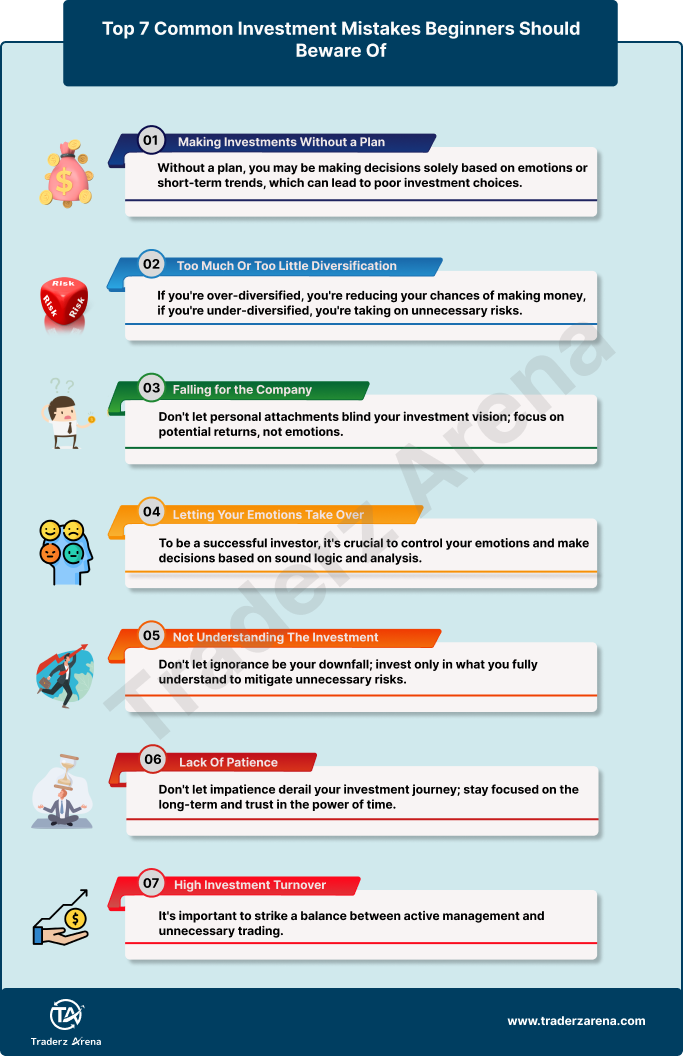
So you’ve decided to start investing to build wealth and secure your financial future. That’s fantastic – but before you dive in headfirst, there are a few common mistakes beginners often make that can seriously hamper your investment returns. As a beginner, the learning curve is steep and there’s a lot of noise out there that can lead you astray, The good news is these mistakes are easily avoidable if you learn what to watch out for. Taking stock trading classes can provide you with valuable knowledge and skills to navigate the complexities of investing effectively.
Top 7 Common Investment Mistakes Beginners Should Beware Of
Read on to discover the top common investment mistakes beginners should beware of so you can sidestep them from the start and set yourself up for investment success.
1. Making Investments Without A Plan:
“Without a plan, you may be making decisions solely based on emotions or short-term trends, which can lead to poor investment choices.”
Investors should be cautious about blindly following the herd mentality or basing their investments on social media hype. It can result in a lack of due diligence and understanding of the underlying investment.
Instead, take the time to research, learn, and analyze investment opportunities thoroughly. Seek advice from reliable sources like Traderz Arena and consider the long-term potential and fundamentals of an investment rather than relying on fleeting trends or public opinion.
2. Too Much Or Too Little Diversification :
Diversification is key to investing, but beginners can easily fall into either too much or too little diversification traps.
“If you’re over-diversified, you’re reducing your chances of making money, if you’re under-diversified, you’re taking on unnecessary risks.”
Finding the right balance is crucial. Aim for a diversified portfolio that includes investments across various asset classes, industries, and geographic regions. This strategy helps spread your risk and can protect against market volatility.
3. Falling For The Company:
“Don’t let personal attachments blind your investment vision; focus on potential returns, not emotions.”
Investors often develop emotional attachments to specific companies, particularly those they admire or are familiar with. However, this emotional bias can cloud judgment and lead to poor investment decisions.
Remember, investing is not about personal preferences or brand loyalty; it’s about potential returns and growth prospects. Avoid becoming overly attached to a single company and be willing to reassess your investments objectively.
4. Letting Your Emotions Take Over:
Emotional investing is a common pitfall among beginners. Making investment decisions based on fear or greed can lead to impulsive actions and poor outcomes.
“To be a successful investor, it’s crucial to control your emotions and make decisions based on sound logic and analysis.”
Manage your emotions by setting clear investment goals, sticking to your plan, and avoiding knee-jerk reactions to market fluctuations. Remember that investing is a long-term endeavor and short-term volatility is a natural part of the process.
5. Not Understanding The Investment:
Lack of understanding is another mistake that beginners should avoid. Investing in something you don’t fully understand can be risky. Before committing your money, educate yourself on the investment’s potential risks and rewards.
“Don’t let ignorance be your downfall; invest only in what you fully understand to mitigate unnecessary risks.”
Perform thorough research, consult experts, and seek clarification on any complex concepts or jargon. Develop a solid understanding of the investment strategy, underlying assets, and associated risks to make informed decisions.
6. Lack Of Patience:
“Don’t let impatience derail your investment journey; stay focused on the long-term and trust in the power of time.”
Investing is a long-term game, and impatient behavior can lead to hasty decisions or abandoning investments prematurely. Successful investing requires patience and discipline
You should avoid monitoring your investments constantly or making frequent changes based on short-term market movements. Focus instead on your long-term goals and follow your investment strategy. Be prepared to weather market fluctuations and understand that investment returns often require time to materialize.
7. High Investment Turnover:
Excessive trading or frequent buying and selling of investments can have a negative impact on your portfolio’s performance. High investment turnover leads to increased transaction costs, taxes, and potential losses.
“It’s important to strike a balance between active management and unnecessary trading.”
Consider adopting a buy-and-hold approach for long-term investments and carefully evaluate the reasons behind each trade. Regularly review your portfolio to ensure it aligns with your investment plan, but avoid making changes solely for short-term gains or to chase hot stocks.
When you don’t have an idea of what to do with the turnover, you can
Conclusion
So there you have it., the top investment mistakes beginners often make. By avoiding common investment mistakes and following key principles such as starting with a solid plan, conducting thorough research, keeping fees low, staying invested for the long term, and making rational decisions, beginners can set themselves on the path to investment success and financial freedom.
Remember, mistakes are part of the learning process, so don’t be discouraged. If you’re just starting out, consider enrolling in Traderz Arena, a comprehensive mentorship program that equips you with essential skills, strategies, and knowledge to navigate the market. With determination and experience, you’ll become a savvy investor. You’ve got this! With time and experience, you’ll become a savvy investor.



